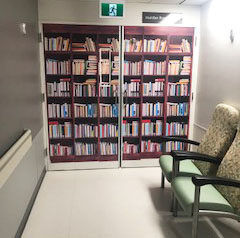Safety strategies: Caring for those living with dementia during the pandemic

The global pandemic has gripped the nation, hitting our most vulnerable hardest and forcing health care settings to make quick decisions to ensure patients and the public remain safe. While hospitals and other health care facilities adjust to a ‘new normal,’ many are developing care plans for those who are less resilient to change.
North York General Hospital’s (NYGH) clinical teams at the Reactivation Care Centre (RCC) quickly realized they had to take proactive measures once COVID-19 began circulating in the community. Implementing changes to ensure the safety and well-being of patients meant new unprecedented challenges for those with dementia.
“Change can be difficult for anyone but we know this particular patient population may regress when something new or different is introduced,” says Priya Mistry, Recreational Therapist at the RCC. “So, our team conducted a review of evidence-based research on wayfinding in patients with dementia. From there, we were determined to find ways to create a supportive environment and eliminate triggers that might prompt behaviours such as wandering.”
North York General’s RCC team worked together to test out strategies for those whose routines were heavily impacted due to COVID-19 restrictions.
“We had a patient who went for weekly outdoor walks with his wife and was accustomed to eating meals and attending recreational therapy group activities in another area,” says Priya. “Once visitor restrictions and social distancing rules were implemented his routine abruptly changed.”
Priya and her team took a compassionate approach to the patient’s care by focusing on his personality and were able to identify that boredom, coupled with lack of stimulation may have been reasons for his wandering. That’s when the group decided they would try removing objects associated with the outdoor environment from the patient’s view, such as jackets and shoes. The team also created a mock dining room in the floor’s alcove and covered exit doors with large bookshelf and waterfall decals.
“The decals were incredibly successful,” says Vinothini Vijayaratnam, Clinical Team Manager at the RCC. The bookshelf decal helps create a homelike setting and deters patients from walking through the doors. The waterfall decal, located on the second door has proven to be
therapeutic and relaxing for some of our most vulnerable patients.”
These ‘outside-the-box’ ideas are also helping improve patient outcomes by reducing the number of instances in which minor injuries can occur, and providing more staff resources for patients, giving loved ones better peace of mind. The RCC team’s dedication to help protect vulnerable patients also means they likely won’t need to be transferred back to hospital, which could contribute to more confusion and disorientation, leading to further setbacks for those with dementia.
“My line of work gives me the unique opportunity to creatively reach personalized, patient-centred goals through a thoughtful, compassionate and respectful approach to care,” adds Priya. “We have patients who are now meditating near the waterfall decal and have expressed the joy of their improved surroundings. It’s extremely rewarding to see how these interventions have made a positive impact on patients.”
About the Reactivation Care Centre:
The Reactivation Care Centre (RCC), located at the former Humber River Hospital Finch site (2111 Finch Avenue West) is a shared hospital collaborative, together with the Central Local Health Integration Network (LHIN), that is designed to care for patients who no longer need care in a hospital but require specialized care to help transition them back home or to another setting.
